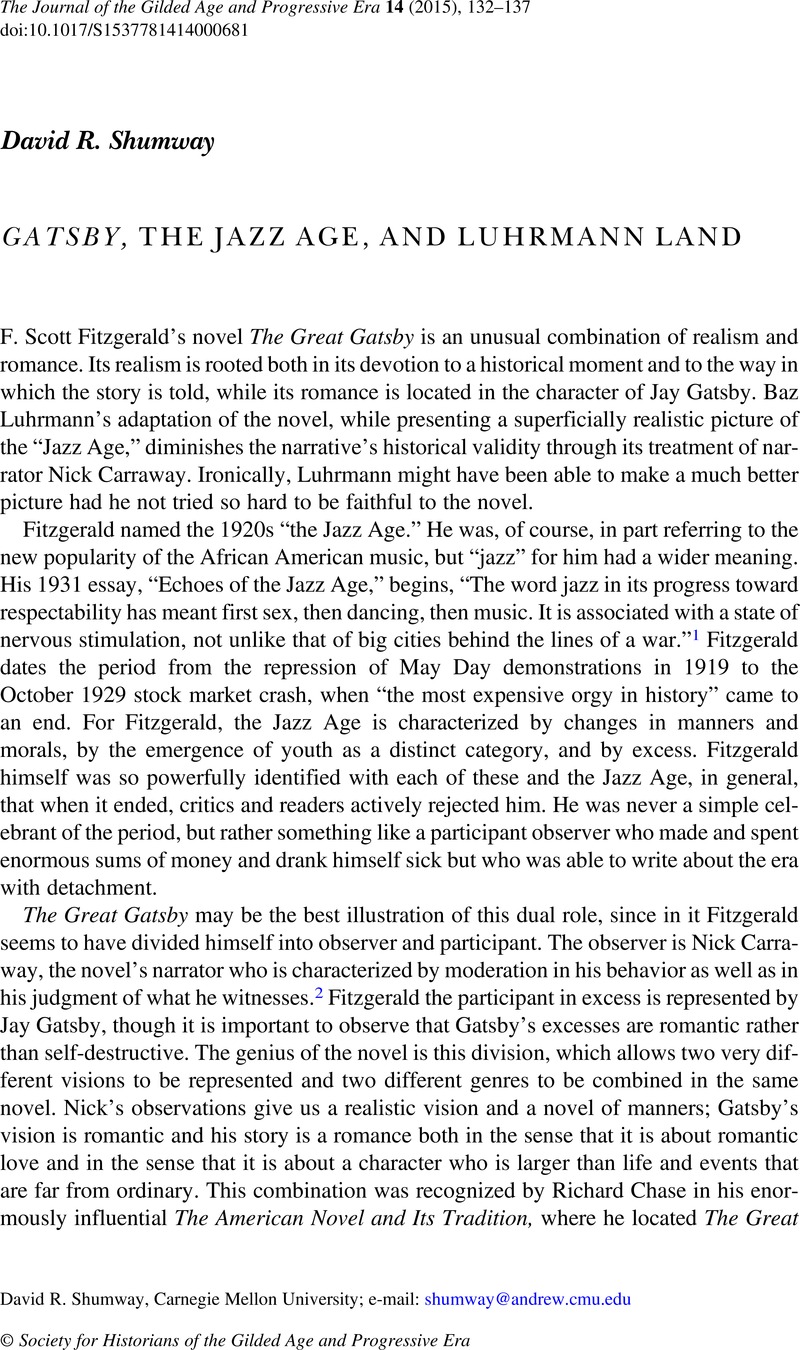Article contents
GATSBY, THE JAZZ AGE, AND LUHRMANN LAND
Published online by Cambridge University Press: 19 December 2014
Abstract

- Type
- Film Review Forum
- Information
- The Journal of the Gilded Age and Progressive Era , Volume 14 , Issue 1 , January 2015 , pp. 132 - 137
- Copyright
- Copyright © Society for Historians of the Gilded Age and Progressive Era 2015
References
NOTES
1 Fitzgerald, F. Scott, “Echoes of the Jazz Age” in The Crack-Up (New York, 1956), 16Google Scholar.
2 Fitzgerald, “Echoes,” 21.
3 Chase, Richard, “Three Novels of Manners” in The American Novel and its Tradition (Baltimore, 1980 [1957]), 157–184Google Scholar.
4 Fitzgerald, F. Scott, “The Rich Boy” in Babylon Revisited and Other Stories (New York, 1960), 152Google Scholar.
5 Fitzgerald, F. Scott, The Great Gatsby (New York, 1925), 6Google Scholar. Subsequent references indicated in the text with the abbreviation TGG.
6 Bailey, Beth L., From Front Porch to Back Seat: Courtship in Twentieth-Century America (Baltimore, 1988)Google Scholar. See also Shumway, David R., Modern Love: Romance, Intimacy, and the Marriage Crisis (New York, 2003), 63–80Google Scholar, on the influence of the discourse of romance on ideas about marriage in the 1920s.
7 Luhrmann, Baz, “The Greatness of Gatsby,” Bonus Disk, The Great Gatsby, special ed. (Burbank, CA, 2013)Google Scholar, DVD.
8 A few critics, including Churchwell, Sarah in her recent book, Careless People: Murder, Mayhem, and the Invention of The Great Gatsby (New York, 2014)Google Scholar, 186, 215, have called Nick an unreliable narrator, but Booth, Wayne, who invented the term, used Nick as the model of a reliable first person narrator, The Rhetoric of Fiction, 2nd ed. (Harmondsworth, 1991 [1961])Google Scholar. See also Murphy, Terence Patrick, “Defining the Reliable Narrator: The Marked Status of First-Person Fiction,” Journal of Literary Semantics 41, no. 1 (2012)CrossRefGoogle Scholar.
9 F. Scott Fitzgerald, “My Lost City” in The Crack-Up, 23–33.
10 Jameson, Fredric, Postmodernism, or, The Cultural Logic of Late Capitalism (Durham, NC, 1991)Google Scholar, 18.
11 Churchwell's Careless People suggests that Fitzgerald may actually have toned down his description of the wild parties he himself participated in, since, for example, his wife Zelda, seems to have been fond of disrobing at them.
12 Wilson, Edmund, “F. Scott Fitzgerald” in F. Scott Fitzgerald: A Collection of Critical Essays (Englewood Cliffs, NJ, 1963), 81Google Scholar.
13 A. O. Scott, “Shimmying Off the Literary Mantle,” review of The Great Gatsby, New York Times, May 10, 2013.
14 Shumway, Modern Love, 52–62.
- 1
- Cited by




